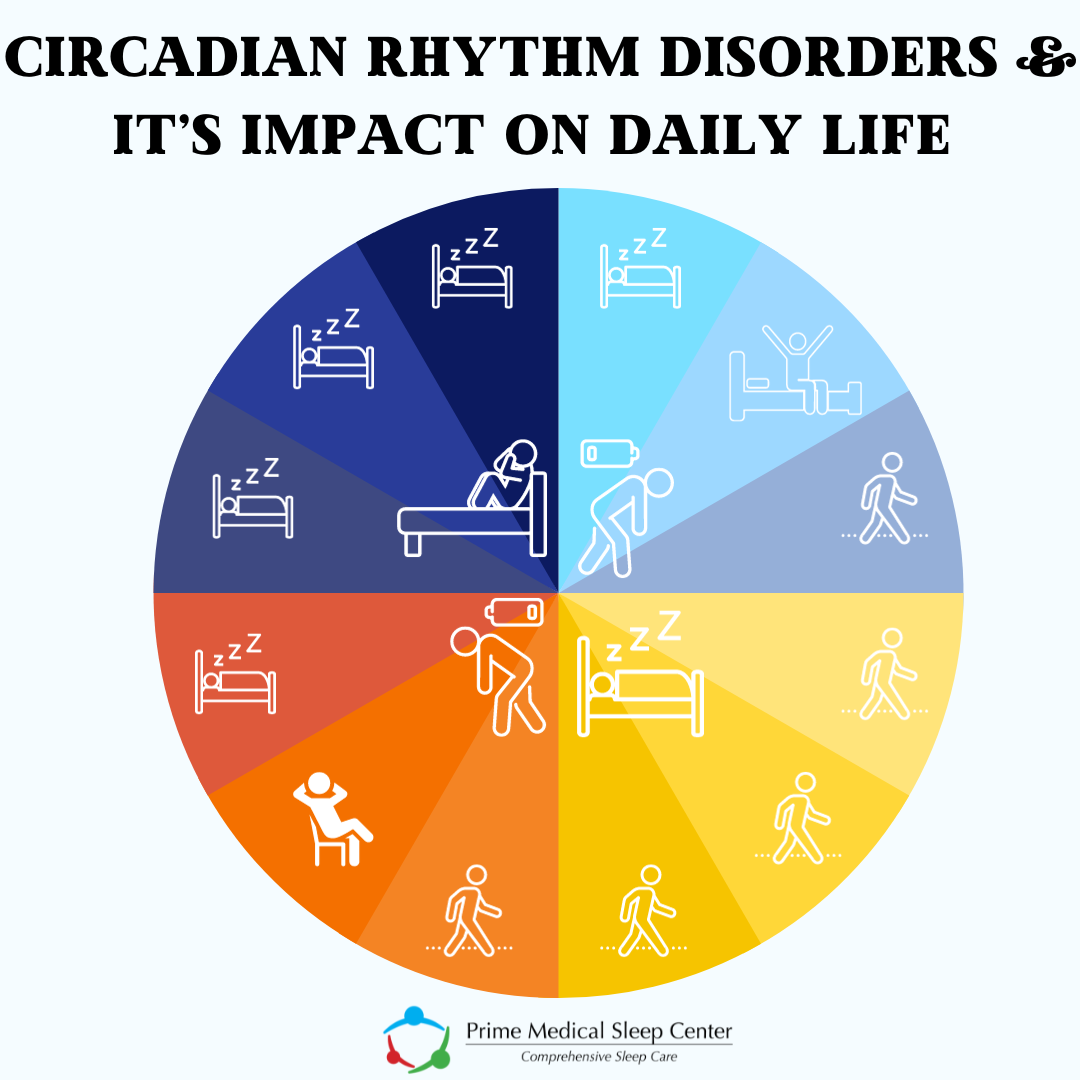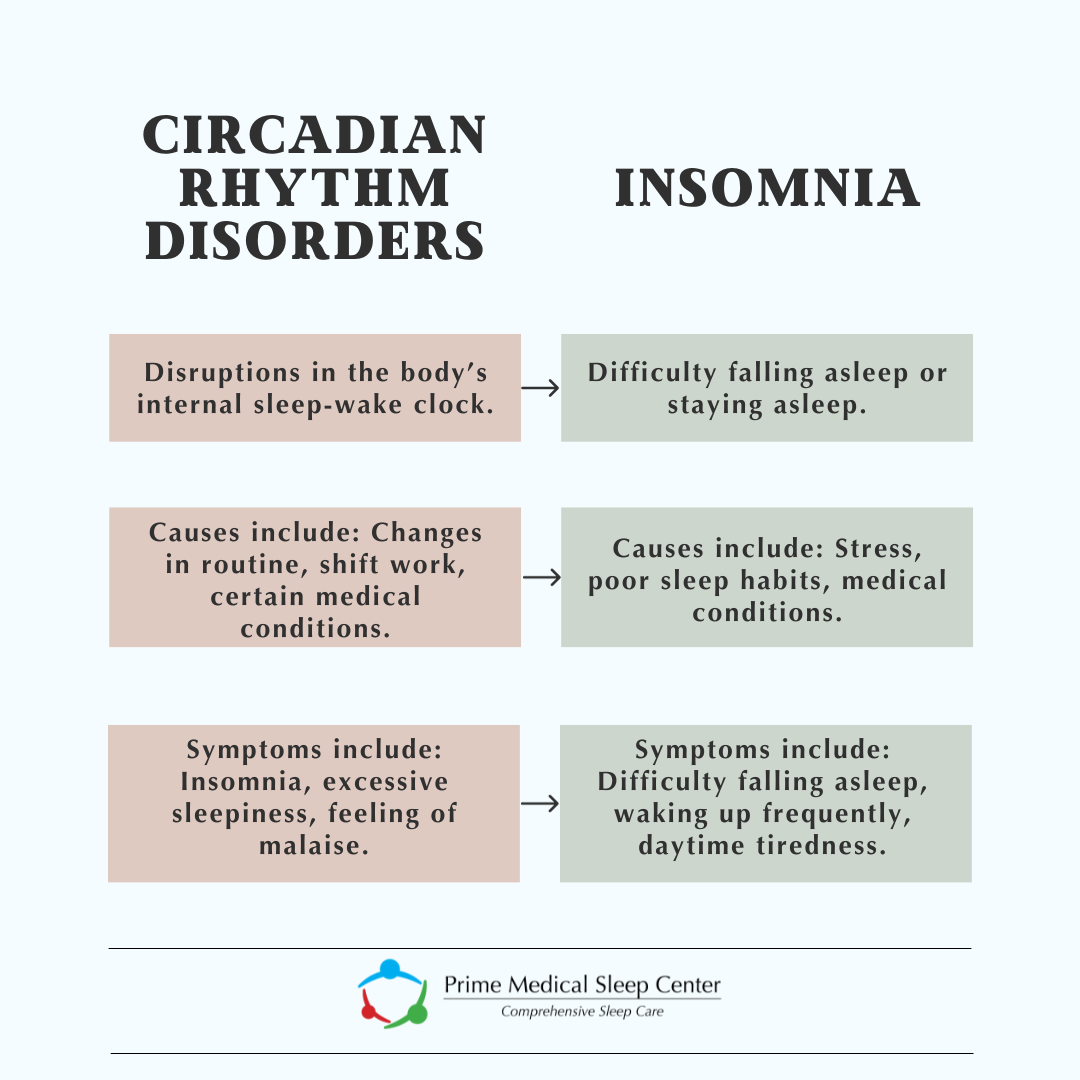
In the hustle and bustle of daily life, we often take our body’s natural rhythms for granted. Like a well-oiled machine, our internal biological clock, or circadian rhythm, guides our sleep-wake cycle, metabolism, and even mood. But what happens when this intricate system falls out of sync? This disruption leads to what we call Circadian Rhythm Disorders.

Understanding Circadian Rhythm Disorders
Circadian Rhythm Disorders are a group of sleep disorders affecting the timing of sleep. Individuals with these disorders are unable to fall asleep and wake up at the times required for work, school, and social needs. Their biological clocks don’t align with societal norms, leading to significant distress and impairment in social, occupational, or other important areas of functioning.
Types of Circadian Rhythm Disorders
- Advanced Sleep-Wake Phase Disorder (ASWPD)
- May experience a difficulty staying awake in the early evening, which leads to waking up too early in the mornings.
- Delayed Sleep-Wake Phase Disorder (DSWPD)
- Most common. May fall asleep later than ideal and find it tough to wake up when planned in the morning.
- Irregular Sleep-Wake Rhythm Disorder (ISWRD)
- May have multiple short periods of sleep and wakefulness. This can cause taking many naps or not being able to sleep during the night.
- Non-24-Hour Sleep-Wake Rhythm Disorder
- Occurs when your sleep-wake rhythm does not sync with a 24-hour day. Sleep may become delayed.
- Common for those who get limited light exposure and people who are completely blind.
- Shift Work Disorder
- Affects individuals who work during the night or who have a rotating schedule.
- Jet Lag Disorder
- Temporary disorder that can occur when traveling across time zones in a short period of time.
The Causes Behind the Disorder
Numerous factors can cause circadian rhythm disorders. They could result from alterations in our internal body clock due to genetic factors or changes in our routine like shift work or frequent travel across time zones. Certain medical conditions, medications, changes in routine, and even age can also contribute to the development of these disorders. It is important to note that it is estimated 10% of the adult population suffers from CRSD.

Signs & Symptoms
People suffering from circadian rhythm disorders often experience insomnia at night, excessive sleepiness during the day, and a general feeling of malaise. These symptoms can lead to reduced performance at work or school, mood disturbances, and a decreased quality of life. Jet lag disorder can be temporary, while other circadian rhythm disorders untreated can result in various medical, social and/or psychological consequences.
Some of these disorders are confused with insomnia, which is why many individuals may never know they have CRSD. At Prime Medical, we will not mistake insomnia for CRSD through utilizing our advanced tests and sleep studies, we will ensure you walk out of our sleep lab with clarity!
Finding Help at Prime Medical Associates
If you’re struggling with a disrupted sleep pattern, it’s crucial to seek professional help. At Prime Medical Associates in Dartmouth, Massachusetts, Dr. Arun Rajan specializes in diagnosing and treating a wide range of sleep disorders in children and adults aged 11 and up. With extensive training and experience in sleep medicine, Dr. Rajan understands the intricacies of the human sleep cycle and the impact of its disruption on daily life.
At Prime Medical Associates, we utilize state-of-the-art diagnostic tools to understand the root cause of your sleep issues. We firmly believe that each patient’s sleep disorder is unique and requires a personalized approach. Our team works with you to develop an individualized treatment plan that aligns with your lifestyle and needs. Prime Medical’s practice features a comfortable, fully equipped sleep lab accredited by the American Academy of Sleep Medicine!
Navigating Circadian Rhythm Disorders
Remember, while living with circadian rhythm disorders can be challenging, it’s not something you have to face alone. Dr. Rajan and the team at Prime Medical Associates are here to guide you through the journey towards better sleep and improved overall health.
If you suspect you or a loved one is dealing with a circadian rhythm disorder, don’t hesitate to reach out to us at Prime Medical Associates. Let’s work together to reset your biological clock and get your life back in sync. Learn more here or call (508) 993-9781.
